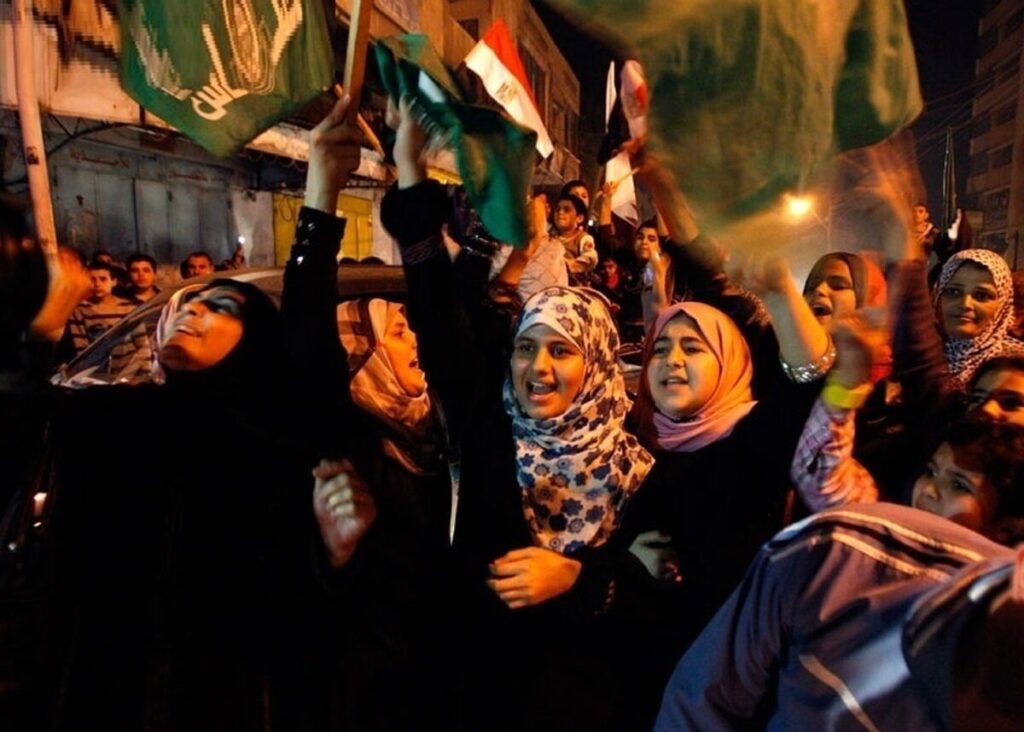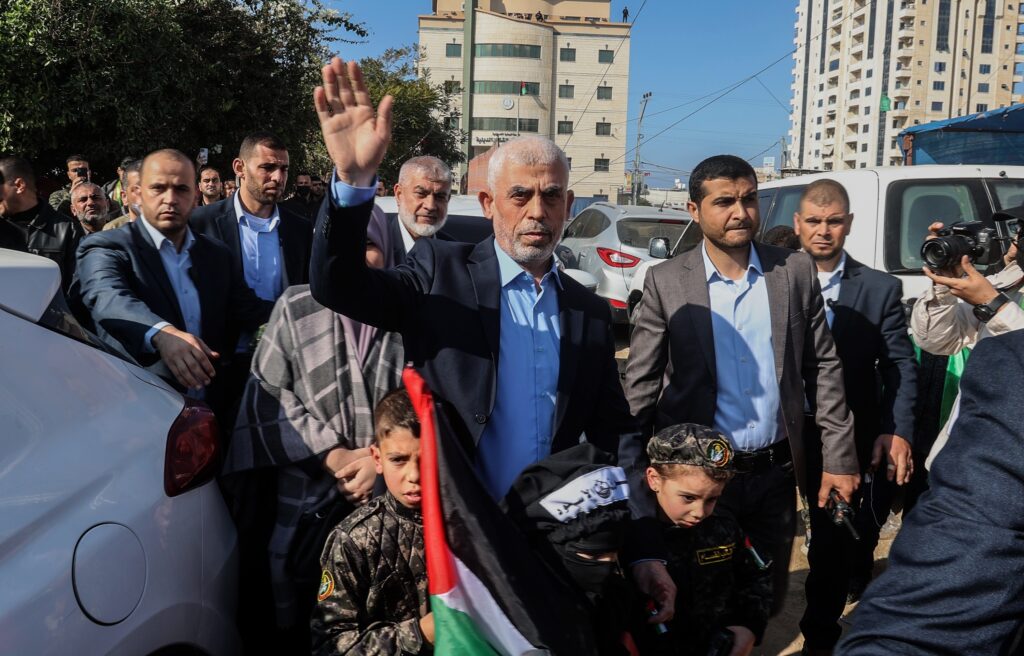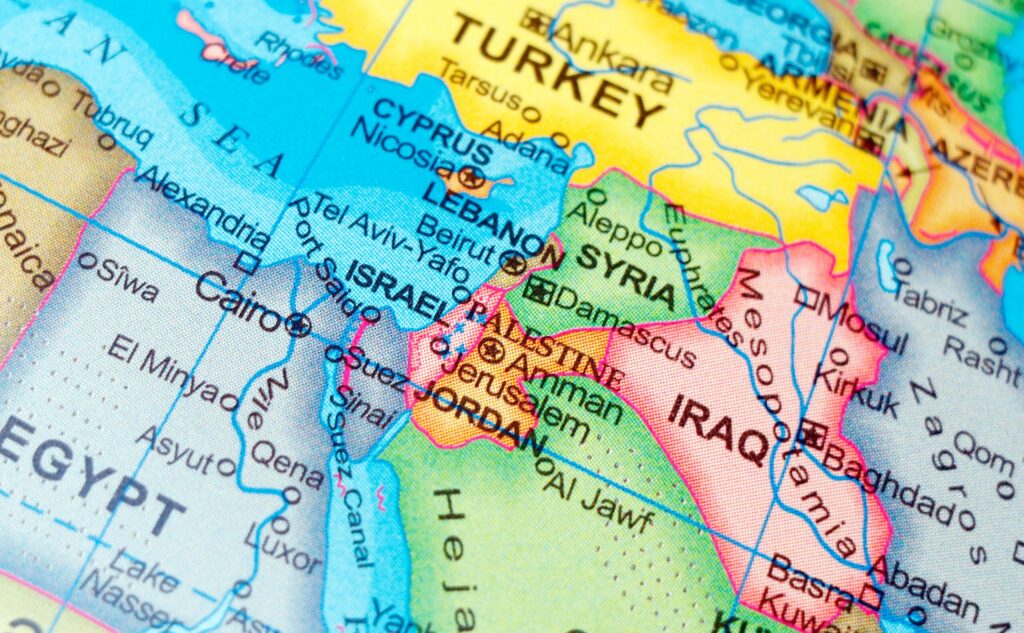UPDATES
Hamas, Israeli Security and Peacemaking
Sep 3, 2010
Update from AIJAC
September 3, 2010
Number 09/10 #02
Following the Israeli-Palestinian Summit in Washington yesterday (in which the details of discussions were kept discreet – see here and here), this Update features some comments on Hamas’ role as a potential spoiler in the wake of the Hamas terror attack Tuesday, which left four Israeli civilians dead, and a second non-fatal attack Wednesday night – with the Palestinian Authority predicting more such efforts by Hamas.
First up is Washington Institute for Near East Policy peace process specialist David Makovsky, who looks at these Hamas efforts to torpedo peace progress in historical context. He points out that while Hamas is unequivocal that the attacks are designed to sabotage the talks, its attempt to repeat a gambit it used to damage talks in the 1990s is less likely to be successful this time. The difference, he points out, is that in the 1990s, Yasser Arafat played a double game, privately encouraging terrorism, and Israelis understood this, but Abbas is genuinely cooperating with Israel to improve security. For Makovsky’s full argument, CLICK HERE. Also discussing the link between terrorism, Israeli security and peace, is the Jerusalem Post in an editorial.
Next up, Barry Rubin puts Hamas attempts to play the spoiler in a larger context, in which terrorism is not “senseless”, as US President Obama said, but an often rational short-term strategic tool and a problem which is not going to go away. He criticises the US for both failing to make perpetrators of terrorism pay a price for it, and for opposing Israeli efforts to pressure Hamas in Gaza. He also cites Fatah’s continuing flirtation with promoting and rewarding terrorism, and calls for more realism in seeking a two-state resolution. For the rest of his important insights, CLICK HERE. Also arguing that Western policy toward Hamas is making peace more difficult is US analyst Jonathan Schanzer.
Finally, on a separate issue, Washington Institute scholar David Schenker comments on Egyptian participation in the Summit, and places it in the context of Egypt’s reduced role across the Middle East region. Schenker notes that Egyptian President Hosni Mubarak took his son Gamal to the Summit, which appears confirmation that the President is indeed in ill-health and is preparing the way for his son’s succession. Schenker notes that Mubarak’s decline parallels various signs of reduced Egyptian power in the region, and examines how this loss of stature affects US and Western regional policy. For all the important details, CLICK HERE.
Readers may also be interested in:
- For those who did not see it in today’s Australian, here is an article by AIJAC’s Colin Rubenstein giving his take on the prospects for the new Israeli-Palestinian talks.
- Hussein Ibish and Michael Weiss, activists coming from very different perspectives, come together to argue that the “real news” in the peace process is the economic progress in the West Bank and to call for greater international support for this.
- An interesting analysis of the position, role, and apparent thinking of Israeli PM Binyamin Netanyahu in the peace process.
- Noted academic Max Singer looks at some ways an Israeli-Palestinian peace may have to be inequitable to work.
- American Senator Scott Brown argues that Middle East prospects are doomed unless more is done about the Iranian problem.
- A prominent Lebanese journalist takes on the oppression Hamas is instituting in Gaza.
- An article on the likelihood Israel will face a particularly ugly September at the UN and other traditionally hostile international forums.
Hamas Attacks: Deja Vu All Over Again?
By David Makovsky
USA Today Online, September 2, 2010
On Tuesday night, Hamas shot dead four Israelis on the outskirts of Hebron, putting an end to nearly three years of quiet on the West Bank. They struck again the following day, this time critically wounding two. Abu Ubaida, spokesman for Hamas’s armed wing, announced the Qassam Brigades’ “full responsibility” for the attacks, adding that they are merely “a chain in a series of attacks: Some have been executed, and others will follow.” That the attacks came on the eve of Mideast peace talks is a grim reminder that spoilers will try desperately to upend hopes for negotiations seeking to end the conflict.
Hamas’ latest attack is reminiscent of the tactics they employed in the 1990s, when their aim was to plant a bomb on an Israeli bus immediately preceding a key moment of peace negotiations.
Yet, violence in the ’90s did not succeed in forcing Israel to withdraw from the West Bank. Four bombs in the course of nine days preceding the 1996 election only angered Israelis and led to Benjamin Netanyahu’s first victory as prime minister. Hamas attacks had another effect. They decreased the popularity of peace talks among the Israeli public, rendering withdrawal tantamount to vulnerability, not security.
Arafat’s Role
Although Hamas’s violence soured the mood for peace, it was because there was something even greater at work: The attitude of Yasser Arafat. The infamous Arafat was known in Israel to surreptitiously encourage terrorist killings while condemning violence on a pro forma basis, believing that it was actually a tool for negotiations. As Chief of Staff Lt. Gen. Amnon Lipkin-Shahak told Israeli Radio in March 1997, “Organizations such as Hamas and Islamic Jihad have an understanding from the Palestinian Authority to carry out attacks.” This comment was issued merely days after Arafat personally met with Hamas leaders in Gaza, giving them the “green light” to resume terrorist attacks.
As a result, when the beloved peacemaker Yitzhak Rabin said Israel will pursue peace as if there is no terror and terrorists as if there was no peace, it would ultimately ring hollow for Israelis. The Rabin formula could only work if Arafat had not been playing a double-game, privately encouraging terror while officially condemning it. Had the double-game dimension been absent, nobody would want rejectionists to have a veto on peacemaking.
In sum, the issue was not just terrorist violence, but the actions taken by the Palestinian Authority (PA) to encourage violence. While Israel could not expect 100% results, they did expect the PA to provide 100% effort.
Could we see a repeat of the 1990s — an upsurge of terrorism on the eve of peace negotiations? Fortunately, current Palestinian President Mahmoud Abbas is not the same man that Arafat was. Whereas Arafat perpetually had a gun strapped to his belt, Abbas is viewed differently — an in-house intellectual of the Palestine Liberation Organization. While Arafat had direct links to terror attacks and was known to favor jihad, Abbas is more associated with the non-violent path. He has always preferred links with Israel, even running for PA presidency in 2005 on the basis of achieving a two-state solution through peaceful means and criticism of the 2000-2004 violence powered partly by Hamas.
Abbas’ enmity toward Hamas has grown and not diminished. In 2007, Hamas literally threw Fatah party members off the rooftops of Gaza and trashed his Gaza office. Hamas and Abbas are bitter rivals.
Israel and the PA
In short, unlike Arafat during the ’90s, nobody thinks that Abbas is playing a double game. Prime Minister Salam Fayyad’s condemnation of the attacks as “totally against our national interests and our commitments” is undoubtedly sincere. As Abbas said, the attacks were a deliberate intent to “disrupt the political process,” which he nevertheless intends to continue.
So if malevolent will is not the issue, the question could be the PA’s capability. Will Abbas be effective in halting Hamas attacks prior to and even after the creation of a Palestinian state? The good news is that security coordination between Israel and the PA is excellent. While 410 Israelis were killed in suicide bombings and other attacks emanating from the West Bank in 2002, only one such fatality has occurred in the last three years prior to Tuesday’s attack. Cooperation between the security services of both sides is growing to the extent that the PA no longer hides its cooperation with Israel, even inviting Israeli security forces to witness Palestinian live-fire exercises. Such coordination is a top priority of Abbas and Fayyad, who personally oversee the efforts.
In a statement following recent attacks, Hamas made clear its intention to demonstrate that the security cooperation between Israel and the PA is not strong enough to stop their terrorist activities. The answer of Abbas, no less than Israel, must be the continuation of tight Israeli-PA security cooperation to thwart those who want to sabotage the chances of peace.
David Makovsky is the Ziegler distinguished fellow at the Washington Institute for Near East Policy, where he directs its Project on the Middle East Peace Process.
Back to Top
————————————————————————
Terror Attack Near Hebron
Not An Incident But a Revelation About What’s Happening
By Barry Rubin
Rubin Report, Sept. 1, 2010
An isolated fragment of news, a tragic story, or just another act of terrorism? What’s necessary, however, is to fit events into a broader picture and so it is with the latest attack by Hamas, killing four Israelis driving near Hebron.
What does this mean? What’s it all about? It’s a signal, timed for the restart of direct negotiations, that Hamas will subvert by terror any progress toward Israel-Palestinian peace. Hamas said so explicitly, saying the attack was also against those, “Led astray by the illusion of negotiations” and reminding the PA that its “natural choice…is jihad and resistance.” Fatah leader Marwan Barghouti said the same thing from his Israeli prison cell.
President Barack Obama called the attack “senseless slaughter” against which the United States would “push back.”
But terrorism is hardly “senseless.” On the contrary, it is part of a very sensible strategy that often works in its shorter-term goals.
And how can Obama say the U.S. government is going to “push back” since only a few weeks ago he handed a huge victory to the organizer of this attack, Hamas, by pressuring Israel into reducing sanctions on the Gaza Strip while himself granting about $300 million to pay salaries (through the PA) to civil servants in Gaza who implement Hamas’s policies?
The U.S. government also forgot its former policy of making things tough in the Gaza Strip so that the “moderation” of the West Bank looked better and more beneficial. Now the idea is to promote prosperity in the Gaza Strip so that for some reason–I can’t imagine why–the populace will turn against Hamas.
But here are scenes of Hamas supporters celebrating the attack. They have nothing to worry about, since they know that Western governments and other international forces will block Israeli retaliation against the terrorist group, while now there are no restrictions on non-military goods coming into the Gaza Strip. And if Hamas stages ten more attacks or twenty? If it fires rockets and mortars into Israel or launches cross-border attacks, is there any likelihood that the United States will “push back?”
And if not, then how can America policy have any credibility or leverage?
As mediators and media talk about how peace is in everyone’s interest, this attack reminds us that it is not so clearly in the interest of the Palestinian Authority (PA) which faces massive public opposition (which it has so often fomented) against compromise, internal opposition to making any compromises (among a majority of Fatah leaders), and also the determined opposition of Hamas.
The attack signals to the Palestinian public that “resistance” is an alternative accorded much more honor and respectability even in PA propaganda and ideology. It is Hamas’s counter-campaign to show that violence is preferable. And why not? Murdering Israelis is right in the dominant Palestinian political culture, is made to seem heroic, and doesn’t carry heavy penalties either for the groups doing it or individual terrorists carrying it out.
Here’s one more proof. The PA has just honored a Palestinian mother as a great role model. What is her claim to fame? Four sons in Israeli jails for having tried or succeeded in killing Israeli civilians. How many hundred examples would you like from the last year or two of this positive reinforcement for such deeds?
This Hebron attack also reminds Israel that the PA is unable (and in part unwilling) to stop terrorism. Thus, the creation of a Palestinian state at this time and in these circumstances would not necessarily be a solution ending the conflict but merely a new stage of cross-border attacks, official anti-Israel incitement, and growing power for Hamas and its radical allies within the Fatah group that rules the West Bank.
The radical side, both in Fatah and Hamas, will be aided by Iran, Syria, Hizballah, and revolutionary Islamist forces which this U.S. government has more often engaged than confronted. If that side appears to be winning, why shouldn’t Palestinians join or at least cheer for it?
Moreover, nowadays such acts of terrorism don’t generate real international support for Israel but often suggestions that it should make more concessions faster in order to “end” the violence. Indeed, the New York Times’s opening paragraph on the attack actually succeeded in blaming Israel as the culprit after four of its own innocent civilians are murdered:
“The killing of four Israeli settlers, including a pregnant woman, in the West Bank on Tuesday evening rattled Israeli and Palestinian leaders on the eve of peace talks in Washington and underscored the disruptive role that the issue of Jewish settlements could play in the already fragile negotiations.”
Not the disruptive role of Palestinian terrorism but of Jewish settlements! But guess what? there has been a freeze on building new settlements or geographically expanding existing ones now for 17 years. There has been a freeze on constructing new buildings on existing settlements for almost one year.
There is not now, nor apparently will there ever be, a freeze on Palestinian terrorism. Nor will the Western states demand one, by which I mean not stopping every attack but making a maximum effort to do so, truly punishing (not just for the sin of bad timing!) those involved in such attacks, and demeaning rather than extolling that behavior.
Instead, we are apparently going to see a repeat of the pattern that occurred during the 1993-2000 peace process era in which Hamas (and at times Fatah) terrorist attacks showed that negotiations heightened rather than reduced the level of violence. Peace is preferable but the idea of pressing for formal peace as a panacea is just flat wrong.
Does that mean talks, peace, or a two-state solution are bad? Not at all. But they must be conducted with eyes open, strategies clear, and policies suitably tough. Part of a proper approach would include a concerted effort to subvert Hamas and even overthrow the regime in the Gaza Strip. Instead, in recent months, Hamas has won a major victory: Western pressure on Israel to reduce sanctions to a level ensuring the long-term survival of a terrorist statelet in the Gaza Strip.
Equally, even if the PA cracks down and arrests Hamas activists on the West Bank, these people will soon be released and the organization knows that it suffers no huge or real costs for continued terrorism. The only recourse Israel has to ensuring the terrorists are punished or even properly interrogated is to launch a raid and capture them, an action impossible at present since it would be portrayed internationally as “endangering” the direct negotiations.
For its part, the PA has no interest in crushing the terrorists–who often come, after all, from its own ranks and payrolls–but in merely shutting them up for a short while to avoid blame for upsetting the talks. In the PA’s eyes, the terrorists are not guilty of a terrible crime but merely of bad timing. After all, when Fatah PA decides to launch a new intifada some day these men will be allies again.
It is revealing that the State Department’s background briefing on the direct negotiations by a senior administration official explained that Hamas will only be able to join the talks if it ceased terrorism and accepted Israel’s continued existence. There was not one word about pressures on Hamas for refusing to do so, nor on the PA for generating incitement to violence. All carrots, no sticks.
Regarding terrorism, we see the same thing. Some very nice words from Secretary of State Hilary Clinton about how terrible terrorism is and how, “The forces of terror and destruction cannot be allowed to continue.” But, in fact, U.S. policy is not doing much to stop them except arguing that diplomatic efforts toward peace will do so. And when she adds that the PA represents “those Palestinians who themselves have rejected a path of violence in favor of a path of peace.”
It is the fallacy of that statement that undermines her whole argument. The West Bank Palestinians and PA have not rejected the path of violence in principle, in fact the fact that they won’t walk down the path of peace is due both to their hopes of finding violence useful in the future and their fear that too much moderation will bring violence (from their own people whose anger and hatred they keep stoking, their more radical and rival colleagues, and Hamas) against themselves.
Again, I’m glad that the PA is far more negotiations-oriented than Hamas or the pre-1993 (Oslo agreement) PLO. Achieving a two-state outcome to the conflict is also clearly the diplomatic road to take. Yet the way this is being done and the ideas guiding the U.S. and European approach will ensure that the whole effort is a show, not a solution.
Barry Rubin is director of the Global Research in International Affairs (GLORIA) Center and editor of the Middle East Review of International Affairs (MERIA) Journal. His latest books are The Israel-Arab Reader (seventh edition), The Long War for Freedom: The Arab Struggle for Democracy in the Middle East (Wiley), and The Truth About Syria (Palgrave-Macmillan). The website of the GLORIA Center is at http://www.gloria-center.org and of his blog, Rubin Reports, at http://www.rubinreports.blogspot.com.
Back to Top
————————————————————————
Sick Man on the Nile
BY David Schenker
The Weekly Standard, September 2, 2010 3:30 PM
This week, Egyptian president Hosni Mubarak brought his son Gamal to Washington to attend the kick-off of renewed Israeli-Palestinian peace talks. Back in Cairo, the unprecedented family visit will no doubt reinforce the widespread belief that Mubarak is planning a hereditary succession in the Arab republic. It will also confirm, for many, the rampant speculation that Egypt’s president of nearly 30-years is gravely ill.
Since March, when Mubarak paid a lengthy visit to a European hospital specializing in oncology, reports have been circulating that the president is suffering from pancreatic cancer. Recent photos showing the once robust man cutting an uncharacteristically gaunt figure do little to dispel the rumors. Regardless of his diagnosis, the octogenarian’s tenure in office would appear to be nearing an end.
Mubarak’s passing from the political scene will mark the end of an era. It will also mark a nadir in Egypt’s regional stature.
Fifty years ago under President Gamal Abdel Nasser, Cairo was the undisputed military and diplomatic power in the Middle East. Nasser’s speeches mobilized crowds; his army toppled foreign governments.
Today, a once respected and feared Egypt is but a shadow of its former self. Mubarak appears tired and sick. Meanwhile, facing profound challenges at home and its first political transition in nearly three decades, Cairo has largely retreated from regional politics in favor of focusing on internal matters. On almost every front, Egypt evokes a waning regional power.
There are some bright spots. In recent years, Cairo has experienced an annual GDP growth of nearly 7 percent, and even posted impressive numbers during the global economic downturn. But the dynamism ends at the frontier.
Mubarak’s White House cameo notwithstanding, it’s been years since Egypt has exercised significant diplomatic clout in the Middle East. Cairo’s diplomacy has proved especially anemic with its Palestinian neighbors.
Egyptian officials, for example, state they would “not accept the establishment of an Islamic emirate” in Gaza. For the past three years, Cairo has tried to broker an agreement between the Palestinian Authority and Hamas to forestall this outcome.
But that’s all been to little avail. This lack of sway among Palestinians would have been unimaginable years ago. Just recall the 1995 signing of the Oslo II accords. When then Palestinian ra’is Yassir Arafat balked at initialing the maps, Mubarak reportedly convinced Arafat to do so by ordering him to “sign you dog!”
Cairo’s approach to the seeming dissolution of its southern neighbor, Sudan, has proved equally ineffective. Whether out of indolence or resignation, despite its professed desire to thwart an Islamic state in Gaza, Cairo appears indifferent to a similar prospect in Khartoum. In any event, notwithstanding the slaughter in Darfur, Egypt is said to only have some 4,000 troops stationed in Sudan and seems ambivalent about the impending division of its southern neighbor.
The most striking example of Egypt’s diminished stature, however, concerns Cairo’s access to water. The Nile River is the lifeblood of Egypt, providing nearly all of the state’s water, and per a 1929 agreement, Egypt receives nearly 70 percent of the river’s flow and veto power over all water projects in upstream riparian states. Recently, though, this Egyptian dominance of the Nile has come into question as members of the Nile Basin Initiative (NBI) have begun to agitate for a more equitable arrangement.
The fact that Cairo can neither persuade—nor intimidate—NBI member states Ethiopia, Uganda, Rwanda, Kenya, and Tanzania to continue the present arrangement speaks volumes as to Egypt’s standing in Africa. With its population predicted to surge to 100 million by 2025, water could well constitute yet another Achilles heel for the state that Greek historian Herodotus once called “The Gift of the Nile.”
For Egypt, none of this is good news. But for Washington—which has since 1978 relied on Cairo as its key Arab partner—the weakening of Egypt is yet another blow to an already shaky U.S. regional security architecture. Indeed, with Ankara moving away from its traditional alliance with Washington and a diminished Cairo looking inward, the Obama administration today has no militarily formidable Muslim partners to help counter the threat posed by Tehran.
But the impact of an increasingly diminished ally in Cairo goes beyond the crisis with Iran. When Egypt was strong, its powers of persuasion helped Washington articulate and promote policies advancing the causes of regional moderation and peace with Israel. Now that Egypt can no longer play this role, it will be harder for the U.S. to accomplish many of its policy goals in the Middle East.
Of course, the decline of Egypt is only the latest in a series of problematic developments for Washington in the region. The recent re-orientations of the Turkish and Lebanese governments away from the west and a strengthening Iranian-Syrian axis should constitute a clarion call to action for the Obama administration. Unless Washington does something dramatic to reverse it, the weakening of Egypt will constitute another example of diminishing American power in the region.
David Schenker is Aufzien Fellow and director of the Program on Arab Politics at the Washington Institute for Near East Policy.
Tags: Israel











